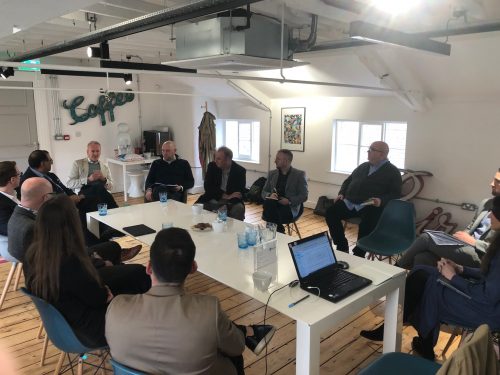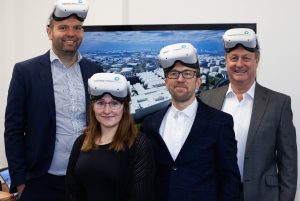Round table report: ‘We are relentlessly dissatisfied and relentlessly optimistic’


What does it take to be a true disruptor in the tech sector in 2023?
Ben Dorks: At the heart of Ideagen is the company’s agility. Businesses that evolve and change need to have transformation and a culture that embraces change. Ideagen’s ability to change and adapt is essential to its success.
Luke Draper: How do you do that when you’re such a big animal?
Dorks: You have to recognise the need to go through different inflection points and constant evolution and how you adapt that. We have a constant transformation team; whatever we do today is likely to be wrong in 18 months, and in reality we don’t really complete a transformation – the last hard yards don’t exist, because we’re onto the next thing.
Draper: We deal with businesses of all sorts of size. To actually get that change across the board at a company, you never actually complete it.
Nadeem Raza: Change can be hard. There is often no shortage of ideas – the is challenge is which take forward. On top of that, if that is the wrong decision to make, we also have to have a filter on ideas. We have to be willing to kill an idea and try something different.
Andy Wallace: People are a very good thing, but as a development shop can they can also be a bad thing!
Josh Dickerson: Culture is key. We bring people in to the business from completely different industries, but everyone believes in the same ethos. We have some rules and guidelines in place, but we give people the freedom to run with ideas.
Ian Mason: I’m not convinced on the size of company is conditional on how you disrupt. I don’t think you can disrupt yourself – the industry has to evolve and be disrupted.
Dorks: I slightly disagree. My honest view is that you do need to disrupt yourself. You either grow or you’re dead. We are relentlessly dissatisfied and relentlessly optimistic.
Raza: you have to be willing to cannibalise your own product. Look at Apple; they discarded the iPod and came up with the iPhone. You have to be willing to lose revenue in the short term if you know you’ve got something better.
Draper: It’s all about seeing nuggets of opportunity. In every business out there is the slightest thing that their competitors won’t be doing.
Ileana Lupsa: I agree with Luke, and that one thing could have ripple effects across the whole sector.
What’s the role of the Midlands tech sector in promoting social mobility and creating opportunity.
Claire Knee: Our message is epitomised by the fact that we don’t want to be attracting young people asking them to follow rules. We want to know how can we support them to be creative so that we’re very much elevating tech to be transformational.
Dorks – Tech is very middle class industry. If start to break it down, though, it’s part of everyday life. As an industry we don’t invest in diversity and social mobility enough. The Midlands is powerhouse of tech – but also has real diversity.
Knee: We’re encouraging our people to be role models and at the time same giving other young people hope that they can have hope about joining the sector.
Paul Humphreys: The younger generation are digital consumers. We need to open their eyes about opportunities this brings for the tech sector.
Christopher Tebbs: Its obvious that more need to be done – only need to look at businesses setting uo own skills academy, such as Rolls-Royce, Toyota and Alstom RR, Toyota, Alstom. Younger people in school aren’t being taught tech skills so the private sector is having to fund it itself.
How can we ensure that the best tech talent remains in the Midlands?
Mason: It’s very difficult. Location isn’t an issue – you can get London wages in Birmingham. It’s just that every industry is now a tech industry.
Draper: I think we’re at a really pivotal stage now where AI is going to become even more relevant. We’re at a tipping point, and I’m not sure where it’s going to go. It’s a Napster moment. – Real pivotal stage where AI is going to become even more important.
Humphreys: I think AI is going to create an environment where we have no critical thinkers – that could be a big problem.
Raza: We have to create more problem solvers who know how to use these things. In education there is not enough focus on people who are curious or ask the big questions.
Dickerson: We’ve got the people we can bring into the business with the technical skills – but we have to train them to add value.
What do you see as the biggest barrier to growth in the sector over the next 12 months?
Draper: Getting the right staff. We are a human IT company; it’s about finding the right person with the right mixture of technical knowledge and people skills.
Wallace: For me, it’ll be about senior execs within bigger companies being continuously rewards by not taking risks.
Dickerson: Uncertainty in the economy – property requires investment.
Dorks: Growth less of an issue for us; it’s about creating sustainable “forever business”.
Richard Blackmore: What I’m hearing from across all sectors is the rising cost of doing business. This is putting a hold on investment projects.
Humphreys: If you’re a high growth business, then access to finance remains a challenge. Disruptors need to find ideas on how to do this quickly.
Mason: Getting the right staff. There are only so many roles within my company that can’t be local.
Tebbs: With regard to the businesses we speak to, it’s about finding the right people with the right skills – and then keeping them.
Luspa: SME support. There is a lot of support around for start-ups, but we need more support for scale-ups.
What USP does the Midlands have so that it can become a truly internationally-renowned tech cluster?
Humphreys: It’s about creating environment where people feel like they are really adding value to customer relationships. If the Midlands tech sector is going to deliver for its community it has to be a focus on using own talent.
Dorks: It’s our headquarters – and recruiting people is all about creating a great place to work. People want to be able to burst through the glass ceiling. We’ve created an environment where people wants to be and feel secure. Of course there is always room for improvement and we always have to work hard to retain our staff, but we’re continuously improving.
Panel:
Ben Dorks, CEO, Ideagen
Claire Knee, global community lead, Ideagen
Ileana Lupsa, programme manager, Tech UK, yes
Ian Mason, consultancy director, Vanti
Richard Blackmore, regional director, CBI
Luke Draper, managing director IDT,
Andy Wallace, CEO, The Robot Exchange
Christopher Tebbs, inward investment executive, Marketing Derby
Josh Dickerson, associate director, Deetu
Nadeem Raza, CEO, Microlise









